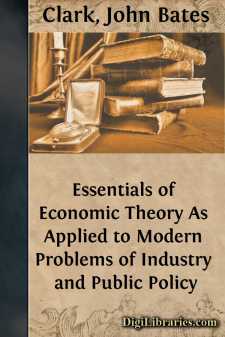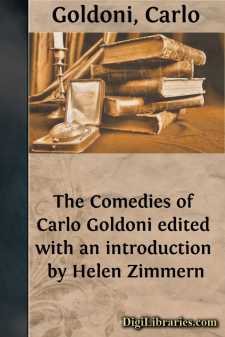Fiction
- Action & Adventure 180
- Biographical 15
- Christian 59
- Classics
- Coming of Age 5
- Contemporary Women 3
- Erotica 8
- Espionage/Intrigue 12
- Fairy Tales, Folklore & Mythology 236
- Family Life 169
- Fantasy 117
- Gay 1
- General 596
- Ghost 32
- Historical 808
- Horror 43
- Humorous 160
- Jewish 25
- Legal 4
- Medical 22
- Mystery & Detective 315
- Political 49
- Psychological 41
- Religious 64
- Romance 159
- Sagas 11
- Science Fiction 730
- Sea Stories 113
- Short Stories (single author) 537
- Sports 10
- Suspense 1
- Technological 8
- Thrillers 2
- Urban Life 31
- Visionary & Metaphysical 1
- War & Military 173
- Westerns 199
Classics Books
Sort by:
by:
John Bates Clark
PREFACE In a work on the "Distribution of Wealth," which was published in 1899, I expressed an intention of offering later to my readers a volume on "Economic Dynamics, or The Laws of Industrial Progress." Though eight years have since passed, that purpose is still unexecuted, and it has become apparent that any adequate treatment of Economic Dynamics will require more than one volume...
more...
The Meaning, Need, and Scope of Sex-education § 1. Sex-education and Its Relation to Sex-hygiene and Social Hygiene Definition of sex-education.Sex-education in its largest sense includes all scientific, ethical, social, and religious instruction and influence which directly and indirectly may help young people prepare to solve for themselves the problems of sex that inevitably come in some form into...
more...
by:
Carlo Goldoni
"Painter and son of nature," wrote Voltaire, at that time the arbitrator and the dispenser of fame in cultured Europe, to Carlo Goldoni, then a rising dramatist, "I would entitle your comedies, 'Italy liberated from the Goths.'" The sage of Ferney's quick critical faculty had once again hit its sure mark, for it is Goldoni's supreme merit, and one of his chief titles...
more...
JEAN MUIR "Has she come?" "No, Mamma, not yet." "I wish it were well over. The thought of it worries and excites me. A cushion for my back, Bella." And poor, peevish Mrs. Coventry sank into an easy chair with a nervous sigh and the air of a martyr, while her pretty daughter hovered about her with affectionate solicitude. "Who are they talking of, Lucia?" asked the...
more...
CHAPTER I THE ANGLO-SAXON HERBALS “Everything possible to be believ’d is an image of truth.”—William Blake. There is a certain pathos attached to the fragments from any great wreck, and in studying the few Saxon manuscripts, treating of herbs, which have survived to our day, we find their primary fascination not so much in their beauty and interest as in the visions they conjure up of those...
more...
by:
William Ashman
ome right in, gentlemen," the Ambassador waved them into the very special suite the State Department had given him. "Please be seated." Colonel Cercy accepted a chair, trying to size up the individual who had all Washington chewing its fingernails. The Ambassador hardly looked like a menace. He was of medium height and slight build, dressed in a conservative brown tweed suit that the State...
more...
Chapter One The Physical Basis if Metaphysics The Hindu system of physics, on which the metaphysical thought of the East is based, does not in its beginnings differ widely from the latest physics of the West; but it goes so much farther that our physics is soon lost sight of and forgotten. The Hindu conception of the material universe, taken from the Upanishads and some open teaching, will serve for an...
more...
by:
William Evans
The world could afford to spare many a magnificent library better than it could dispense with this little Psalm of six verses. If the verses of this Psalm had tongues and could repeat the tale of their ministry down throughout the generations of the faithful, what marvels of experience they would reveal! Their biographies would be gathered from the four winds of heaven and from the uttermost parts of...
more...
by:
Hartley Withers
CHAPTER I CAPITAL AND ITS REWARDFinance, in the sense in which it will be used in this book, means the machinery of money dealing. That is, the machinery by which money which you and I save is put together and lent out to people who want to borrow it. Finance becomes international when our money is lent to borrowers in other countries, or when people in England, who want to start an enterprise, get...
more...
by:
Marcus Dods
INTRODUCTORY NOTE. In order to read the Gospel of St. John with some intelligence, it is necessary to understand its purpose and its plan. For in the whole range of literature there is no composition which is a more perfect work of art, or which more rigidly excludes whatever does not subserve its main end. From the first word to the last there is no paragraph, sentence, or expression which is out of...
more...











